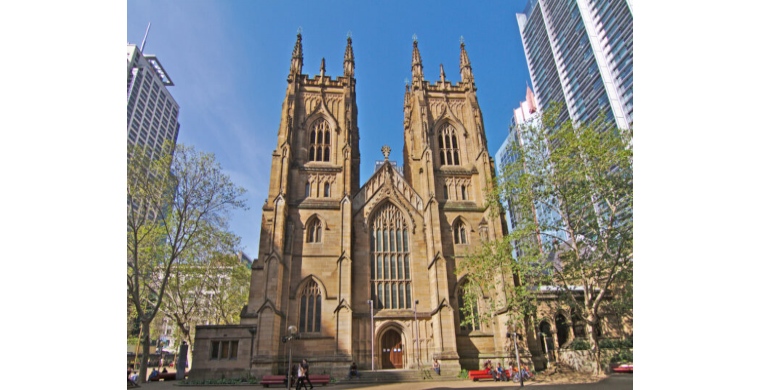Sydney Eases Chastity Rule
St. Andrew's Cathedral, Sydney | Wikimedia
By Robyn Douglass
THE LIVING CHURCH
October 2, 2024
The Diocese of Sydney's synod has rejected an attempt to prescribe the marital status and sexual ethic of workers in its committees, schools, and aid agencies.
The surprising veto was made at the synod's long September sessions, in a discussion over a new governance policy for the diocese. The mammoth policy sets out the management expected of an Anglican parish or organization and the people who serve in Australia's largest and most conservative Anglican diocese.
Elected or appointed governors and leaders will be required to sign a statement of personal faith. It includes adherence to the faith as set out in the Apostles' and Nicene creeds, and belief in the Scriptures as the "supreme authority in all matters of faith and conduct." Officers are expected to resign if they no can longer agree with the statement.
But a clause on marriage and sexual behaviour was deleted in a vote by the lay people of the diocese, 114 for to 272 against. Because the vote was lost in the House of Laity, House of Clergy votes were not counted.
The clause read: "In particular I believe ... that this faith produces obedience in accordance with God's word, including sexual faithfulness in marriage between a man and a woman, and abstinence in all other circumstances."
While rejecting the marriage clause, the synod did later rush through a motion confirming its commitment to traditional marriage "in keeping with the teaching of Scripture, the Book of Common Prayer, and previous resolutions of this synod and of the General Synod." The Very Rev. Sandy Grant, dean of St. Andrew's Cathedral, said his motion was to make it clear that Sydney's synod had not changed its mind on marriage.
While members of boards no longer have to endorse the marriage statement, they remain "called to organisational faithfulness" to Sydney's doctrinal stance.
There are 31 Anglican schools within the diocese, and nine of these are directly affiliated with the diocese. Unlike public schools in Australia, they charge tuition fees to parents, and church school fees range from "low fee" schools, charging less than $10,000 a year, to elite institutions (around AUD$42,000 a year, or US$30,000). Thousands are employed by schools, welfare services, and aged-care homes that would be affected by the governance policy.
Australia has for some years been debating a religious freedom law that exempts religious institutions from anti-discrimination laws, allowing them to choose employees who conform with their faith practices. Sydney's Archbishop, Kanishka Raffel, issued a public statement in support of the bill when it was introduced in 2021.
While the vote may have come as a surprise for the drafters of the policy, Australians in general have made it clear they don't look kindly on churches prescribing their sexual relations.
A vote on to extend legal marriage to same-sex couples was held from in late 2017. The Sydney diocese donated (AUD) $1 million (around US$700,000) to the "No" campaign. Nearly 80 percent of Australians voted in the postal survey, and 61.6 per cent said Yes. By December 9 of that year, the national parliament had removed sex from the requirements to marry.
Brisbane's Archbishop Jeremy Greaves spoke to the Australasian Religious Press Association (ARPA) last week about the future for churches.
While making no comment on the Sydney decision, he began by describing the Australian community's decline in trust for churches. Two public events have contributed to that decline, he said: the churches' responses to child abuse in its institutions (notably the royal commission findings of 2017) and the plebiscite on marriage the same year.
Young people in particular noted many churches' opposition to same-sex marriage, which contradicts their passion for "tolerance, diversity, equality, and inclusion." They are leading the reaction against an institution that sets itself up as the "purity police," he said.
Churches need to show they are "places of life and love," the archbishop said.
"They have to embody the faith in practices which demonstrate love, hope, care, and truth."
Early Christians were known as people of "the way" for their dedication to caring for their neighbors, in their engagement and authentic relationships with others, "not being bound to doctrines," in the archbishop's understanding.
Archbishop Greaves' vision for the future is of a church that "does not build walls even higher, but called to be in the world engaging as salt, light, and leaven."
That will require listening and some humility, "a church that pronounces less, listens more and prepares to be transformed," he said, calling for the courage and creativity to imagine a future more vital than being simply a social club.
The comments were poignant for ARPA, which after 50 years has voted to disband, due to the decline of member church publications -- not just Anglican, but across denominations.
Robyn Douglass grew up in Sydney and Melbourne, completing a journalism cadetship at the Anglican newspaper in Victoria. In South Australia, she has worked for church, local, and national media.














